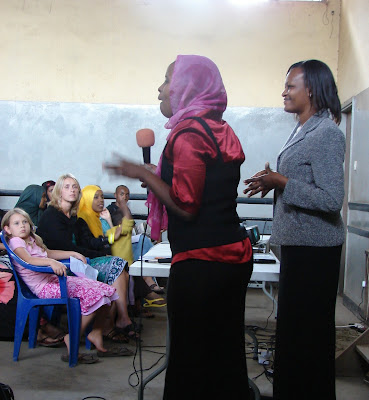
 Iftin student president, Aisha Hussein, addressing today's Women's Self Help Group gathering at the Eastleigh Community Centre.
Iftin student president, Aisha Hussein, addressing today's Women's Self Help Group gathering at the Eastleigh Community Centre.(Tristan was our camera man)
Today was the official re-launch of the women's self help groups within the urban development project in Eastleigh. Over the past year we have learned a lot and made plenty of mistakes along the way. One big lesson has been patience. Westerners, like us, often joke about needing to adjust to "Africa Time", but the fact is that the rhythms of life here are very different from what we are use to in Canada. Kenya is slowly teaching us to slow down and stop rushing, but it is a difficult lesson to learn. When it came to introducing self help groups to refugee women, we missed some crucial issues in our hurry to get things off the ground. Bonds of trust, community acceptance, concepts of group savings and the issue of women in leadership were all areas of key importance that we hadn't dealt deeply enough with in the beginning. Together with the Iftin women, we have slowed down and are carefully building the foundation of trust and understanding necessary for a bringing about successful self help groups that will improve the lives of these women and their families.
It was such a joy today to share the story of Iftin and progress of the self help group initiative with the broader Eastleigh Community, as well as some of our friends here in Nairobi. The chief of Eastleigh North commented after the event that "Women are the future of Kenya" and commended the efforts of the Somali and Oromo women of Iftin.
The Kenyan government has recognized the power of grassroots women's groups in transforming communities. As part of their efforts, Kenya has provided training opportunities for self help group facilitators through a national self help program. Our community coordinator, Zahra, participated in this intense training during March of this year. It was her great pleasure to have her teacher, Lois, speak today to the women of Iftin on the virtues of forming a self help group.
Along with our guests, 167 Somali and Oromo women registered and attended the self help gathering: It was a full house of women, along with a few children running between the chairs. We were truly blessed by the presence of one of the local Muslim leaders, Sheikh Abdi Nassar, who not only prayed with us, but shared a wonderful sermon encouraging the women to embrace their future by working together. His message not only addressed fears among the women about the legitimacy of women in leadership, but went further by urging the women to work to overcome ignorance that only serves to hinder their lives.
spoke about the significance of their coming together
 Aaron sharing the story of Iftin and inviting other women of the community to become apart of a community of change.
Aaron sharing the story of Iftin and inviting other women of the community to become apart of a community of change.
 Aaron sharing the story of Iftin and inviting other women of the community to become apart of a community of change.
Aaron sharing the story of Iftin and inviting other women of the community to become apart of a community of change.and commending the hard work and dedication of the participants.
 The director of the Eastleigh Community Centre, Ehud Gachuga, also addressed the women and shared a broader vision of women coming together to form Self Help Groups that create support, income generating activities, and better lives for each and every family.
The director of the Eastleigh Community Centre, Ehud Gachuga, also addressed the women and shared a broader vision of women coming together to form Self Help Groups that create support, income generating activities, and better lives for each and every family.

the exciting new beginning of the jewelry project as the
seven women move forward as a group to earn a living and
provide for the basic needs of their families.
 The director of the Eastleigh Community Centre, Ehud Gachuga, also addressed the women and shared a broader vision of women coming together to form Self Help Groups that create support, income generating activities, and better lives for each and every family.
The director of the Eastleigh Community Centre, Ehud Gachuga, also addressed the women and shared a broader vision of women coming together to form Self Help Groups that create support, income generating activities, and better lives for each and every family.
Erica put a bracelet made from the
Eastleigh beads on each of the graduates
It was with joy that we and the sheikh presented graduation certificates and gifts to the seven women who completed the ceramic beading training. Together as a community we celebrated their efforts and success!








Happy Canada Day, we pray your day is blessed.
ReplyDelete